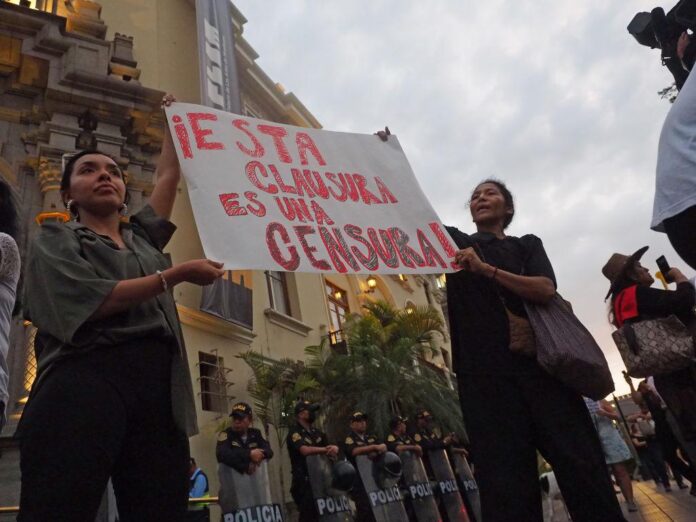The far-right mayor of Lima, Peru, recently closed a local museum memorializing those that died in the violent conflicts between the country’s government and a Maoist guerilla group in the 1980s and ‘90s. Protests at the museum took place the next day.
Lugar de la Memoria, la Tolerancia y la Inclusión Social (The Place of Memory, Tolerance and Social Inclusion), or LUM, was shuttered on March 28 for purportedly failing to meet municipal safety regulations.
But many saw the minor infraction as a thin excuse for Lima’s ultra-conservative mayor, Rafael López Aliaga, to close a cultural venue he has opposed for years. Critics fear the move is part of a broader political effort to whitewash history.
According to the Guardian, López Aliaga has accused the museum of promoting a “false narrative” of the conflicts. He’s called the institution an “offense to the nation” that should be placed under the authority of the armed forces, saying it was time to “take control of the narrative.”
The founder of Peru’s National Renovation party, López Aliaga was elected Lima’s mayor last October. He belongs to the conservative Catholic group Opus Dei and is known for his staunch pro-life position and repeated attacks against gay and nonbinary communities. The politician ran for president in 2021, coming in third.

Police guarding the municipal premises of Lima’s Miraflores district amid protests over the recent closure of the Place of Memory, Tolerance and Social Inclusion (LUM) on March 29, 2023. Photo: Carlos Garcia Granthon/Fotoholica Press/LightRocket via Getty Images.
Peru’s minister of culture, Leslie Urteaga, has said she is working with Peru’s municipality of Miraflores, where LUM is located, to reopen the museum. She also noted that other institutions in the country are similarly in violation of the safety regulations, though they remain open.
In a recent Twitter post, Urteaga said LUM shares the ministry’s aim to “preserve our historical memory. For this reason, we will work so that this space continues to provide services in favor of our citizens.”
“Historical memory is a fundamental value of any democracy,” the European Union’s Peruvian branch said in a statement. The group called LUM a “space where the memory of the period of violence (1980-2000) is preserved,” saying it “calls on citizens to inform themselves and reflect on what they suffered in Peru, so that it is never repeated.”
La memoria histórica es un valor fundamental de toda democracia
El @LUMoficial es un espacio donde se preserva la memoria del período de violencia (1980-2000) que convoca a la ciudadanía a informarse y reflexionar sobre lo sufrido en el Perú, para que no se repita jamás.
? 1/3 pic.twitter.com/8r5NQuyyRb— UE en Perú (@UEenPeru) March 30, 2023
Word of LUM’s closure came the same day that Amnesty International was preparing to make public a report into the protests that have rocked Peru since December when its liberal president, Pedro Castillo, was ousted from office after numerous corruption allegations.
At least 60 people have died in the demonstrations, including many at the hands of armed forces, according to Amnesty International’s investigation.
“With a total of 48 people dead from state repression, 11 deaths from road blockades and one policeman killed, as well as hundreds injured in a tragic period of state violence, the Peruvian authorities have allowed the excessive and lethal use of force to be the government’s only response for more than two months to the clamor of thousands of communities who today demand dignity and a political system that guarantees their human rights,” said Erika Guevara-Rosas, Americas director at Amnesty International.
Nearly 70,000 people died in the conflicts between state forces and the Shining Path activist group between 1980 and 2000, according to Peru’s truth and reconciliation commission.

























